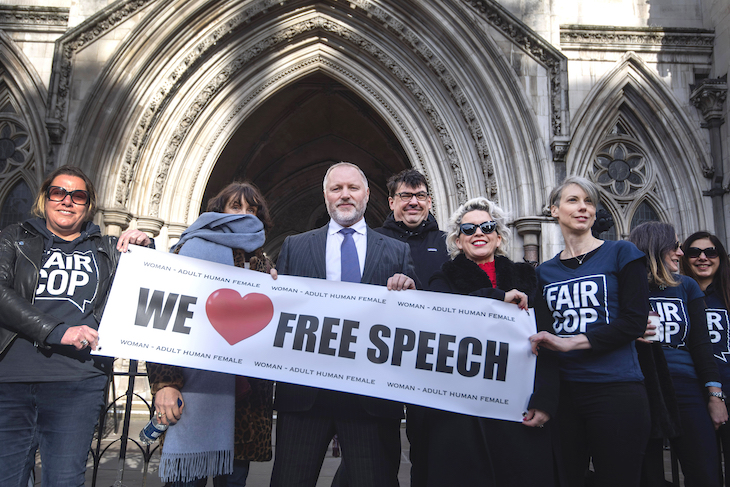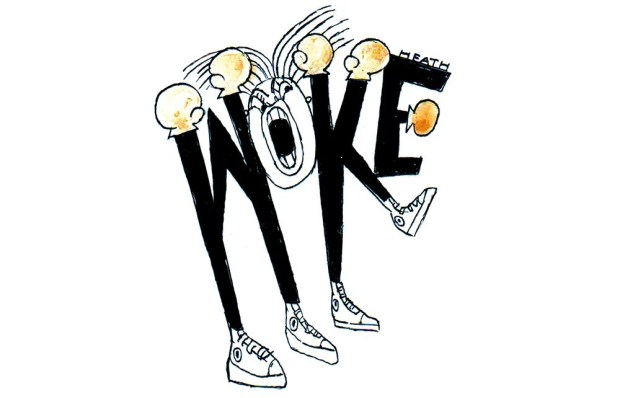The police have no jurisdiction over our thoughts, but that hasn’t stopped them trying recently. Just over a year ago, a plainclothes officer from Humberside Police turned up at my workplace to ‘check my thinking’ for getting involved in the transgender debate online. An individual had taken offence at something I’d retweeted and reported it as a hate crime.
The crime in question? Well, it was retweeting a silly song lyric that brought the complaint, but the subsequent police investigation found another 30 ‘transphobic’ tweets I’d made. As a former police officer myself, I considered the force’s intrusion to be deeply Orwellian. I stated as such to the bemused officer who visited my workplace, but sadly my comment that Nineteen Eighty-Four was a warning, not a manual, flew six feet over his head. Following the publication of my story in The Spectator, Humberside’s assistant chief constable then felt moved to issue a statement. Humberside’s decision to turn up at my office and record my comments online as a ‘non-crime hate incident’ were, they said, a ‘necessary intervention’ designed to prevent my behaviour escalating to criminality. In the lengthy correspondence between our lawyers, the only example of potential escalation they could think of was the murder of Stephen Lawrence.
The recording of ‘non-crime hate incidents’ may be a legitimate means of collecting data in the pursuit of preventing crime and, to this end, Fair Cop – the organisation I set up with Rob Jessel, to fight against authorities that try to limit freedom of speech – is largely supportive of recording incidents this way. However, in a democratic society, a balance has to be struck between police intrusion and the aim of preventing crime. There has to be clear difference between what a person does and how likely it is they will commit an offence. In my case, the evidence consisted of 31 tweets, including the retweet of a feminist lyric, and some terrible existential satire: ‘I was assigned mammal at birth but I identify as fish. Don’t mis-species me, fuckers.’ Humberside police insisted that this evidence met the criteria for a non-crime hate incident, and that this was likely to escalate to criminal behaviour. Fair Cop insisted that it certainly did not. Finally, last Friday, the High Court agreed with us.
It is hard to imagine a more damning choice of words than those used by Mr Justice Knowles, who, in considering his judgment, had clearly dusted down his copies of On Liberty and Nineteen Eighty-Four. In describing the actions of Humberside police, he drew from not one, but three of the most oppressive totalitarian regimes in modern history. ‘In Great Britain, we have never had a Cheka, a Stasi or a Gestapo,’ he told the packed gallery and assembled press, ruling that the force unlawfully interfered with my right to freedom of expression when they turned up at my place of work.
The response from Humberside police to this ruling can only be understood by referencing the five stages of grief. So far, Humberside have mainly taken refuge in denial. Since the High Court decision, they have refused to face the scrutiny of the press, issuing a statement with all the reflective gravity of a parking ticket. According to the statement, they acted in ‘good faith’ when they attempted to police my opinions. Now, they are ‘moving forward’ and will use this judgment as a ‘learning moment.’ It’s almost as if they had been found guilty of treading on the daffodils in search of a missing cat.
But while the High Court ruled that Humberside Police had acted unlawfully when they turned up at my work, the court also said that the policing guidance used by forces across the UK, which defines a hate crime as ‘any non-crime incident which is perceived, by the victim or any other person, to be motivated by a hostility or prejudice against a person who is transgender or perceived to be transgender’, was lawful. Bizarre as it sounds, according to this guidance, currently no evidence of hate is required for the hate element of a hate crime or hate incident; indeed, there is no need for any incident at all. And when anyone can shut down debate by claiming offence and reporting people to the police for non-criminal actions, we no longer live in a free society. That is why Fair Cop is appealing the High Court’s decision that the College of Policing’s Hate Crime Operational Guidance (HCOG) itself is lawful.
This guidance was created to combat hatred, but instead it has only prevented people from stating biological facts. People are free to believe whatever absurdities they please: that there is no such thing as gravity; that two and two make five; that some women have penises. But to criminalise people for disagreeing with these delusions? History provides chilling lessons of what happens when the state starts to police people’s thoughts.
Got something to add? Join the discussion and comment below.
Get 10 issues for just $10
Subscribe to The Spectator Australia today for the next 10 magazine issues, plus full online access, for just $10.




















Comments
Don't miss out
Join the conversation with other Spectator Australia readers. Subscribe to leave a comment.
SUBSCRIBEAlready a subscriber? Log in